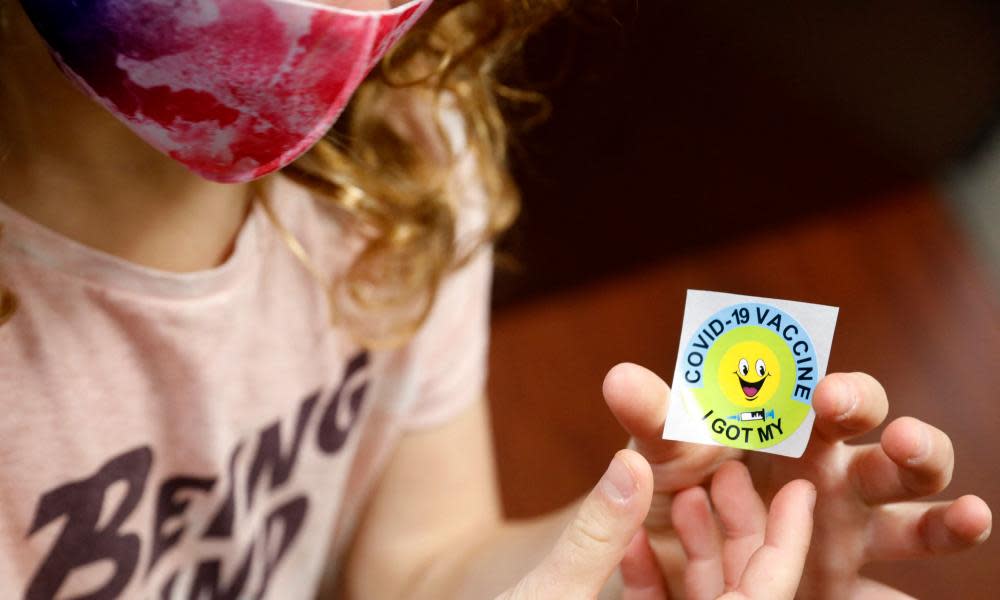US children’s Covid vaccinations lag despite record infections

As the Omicron variant rips through the US, children are being infected with Covid-19 in record numbers – yet their rate of vaccination has lagged, creating a surge in hospitalizations and undermining in-person schooling.
Nearly a million new Covid cases – more than 981,000 – were confirmed in children in the week ending 13 January, a 69% increase from the week before and four times higher than last winter’s peak, according to the American Academy of Pediatrics. That means one in 10 Covid cases among children in the entire pandemic have happened in the past week, the organization said.
Adult rates have shot up, too, with an average of more than 870,000 confirmed cases a day in the US – but children have much lower vaccination rates. Only 18.8% of kids aged five to 11, and a little more than half of 12- to 17-year-olds, are fully vaccinated, according to the US Centers for Disease Control and Prevention.
Hospitalizations for kids are soaring, although severe illness and death are much less likely for children than adults.
“Tons and tons of kids are getting infected this time,” said Almaz Dessie, assistant professor of pediatrics in emergency medicine at Columbia University medical center.
Yet vaccinations are lagging. After a short burst of children’s vaccinations soon after the shot was authorized for the five to 11 age group, progress dropped significantly.
At the New York emergency department where she sees patients, Dessie offers Covid-19 vaccines for kids who come in with non-Covid issues, such as sprained ankles or broken bones.
“We’re seeing a pretty low level of uptake, even now,” she said.
The biggest surprise for Dessie has been talking to vaccinated adults who inoculate their kids against other diseases – but are holding off with Covid.
“People just want a little more time just to see what happens with the vaccine, because it’s so new,” Dessie said. But when it comes to vaccination, she notes, “the benefits are pretty substantial, both to the individual child and to their community”.
Paul Offit, a professor of pediatrics in the division of infectious diseases at Children’s Hospital of Philadelphia, recently cared for children being admitted with Covid complications. “None of them were vaccinated. No one over five was vaccinated,” he said.
Although Covid complications for children are rarer than for adults, they still happen, and more cases means more chances for kids to become seriously ill.
For example, multi-system inflammatory disease in children is one rare but severe outcome from Covid infection that “can be serious and fatal”, Offit said.
Lagging vaccination rates have also contributed to schools struggling to stay open, as students and staff are sickened by the more-transmissible variant.
Offit was recently asked about parents who are worried about sending their children to school during the Omicron surge. “OK, then vaccinate them,” he said. “We’re talking about trying to keep them safe. Here’s an idea: vaccinate your children.”
Vaccines for eligible children don’t just protect their health and the health of those around them, Dessie said: they can also keep schools open and the rest of society functioning.
“There are so many things that children need from school: the socialization, the social supports for low-income children, all of that,” she said. “We need kids in school, and reducing transmission in school will be most easily be achieved by having all children be vaccinated who are eligible.”
Experts say that layering all precautions together – vaccines and boosters, masks, tests, better ventilation and physical distancing – can keep schools safer, but some school districts have been unable or unwilling to do so. In Oregon, hit by a 400% increase in cases in the past two weeks, a group of school nurses have decried the lack of effective precautions.
“Messaging that schools are safe – without taking the steps to make them safe – does not keep children safe,” the 36 nurses wrote in a letter to Portland public schools on Sunday.
School nurses have been on one of the frontlines of the pandemic, said Linda Mendonça, president of the National Association of School Nurses.
“It’s been very challenging,” she said. “They’ve had to really jump into high gear and do things that they normally don’t do on a daily basis.” School nurses frequently trace contacts, test, implement mitigation strategies and run vaccination clinics – all on top of their usual work, which has already become more difficult given the pandemic’s immense physical and emotional burdens.
Implementing every layer of safety is “absolutely” key to continuing in-person learning safely, she said. “Vaccination is one of the [major] public health strategies we have in our toolbox to help fight this pandemic.”
Dessie said she understands families’ hesitations and fears: “They want the best for their kids.
“It’s scary to be a parent right now, and it’s scary to constantly have to make decisions for your child. Everything feels like a risk,” she said.
But the vanishingly rare side-effects of vaccines “are so small compared to the risk of Covid and severe disease from Covid – and all the people they can affect if they get Covid themselves”.
It’s important to explain the safety and effectiveness of the vaccines, she said, and to discuss all questions families have – including the unknowns of what happens if you get Covid while unvaccinated.
“We don’t know, even with mild Covid, what that means for kids,” she said. Long Covid, too, remains little understood, including in children.
Vaccinating everyone, including children, is a crucial part of ending the global spread of the virus, Dessie said. “The more vaccinations you have, across our country and globally, the less likely we are to have the emergence of those new variants like what we just saw the last few months.”

